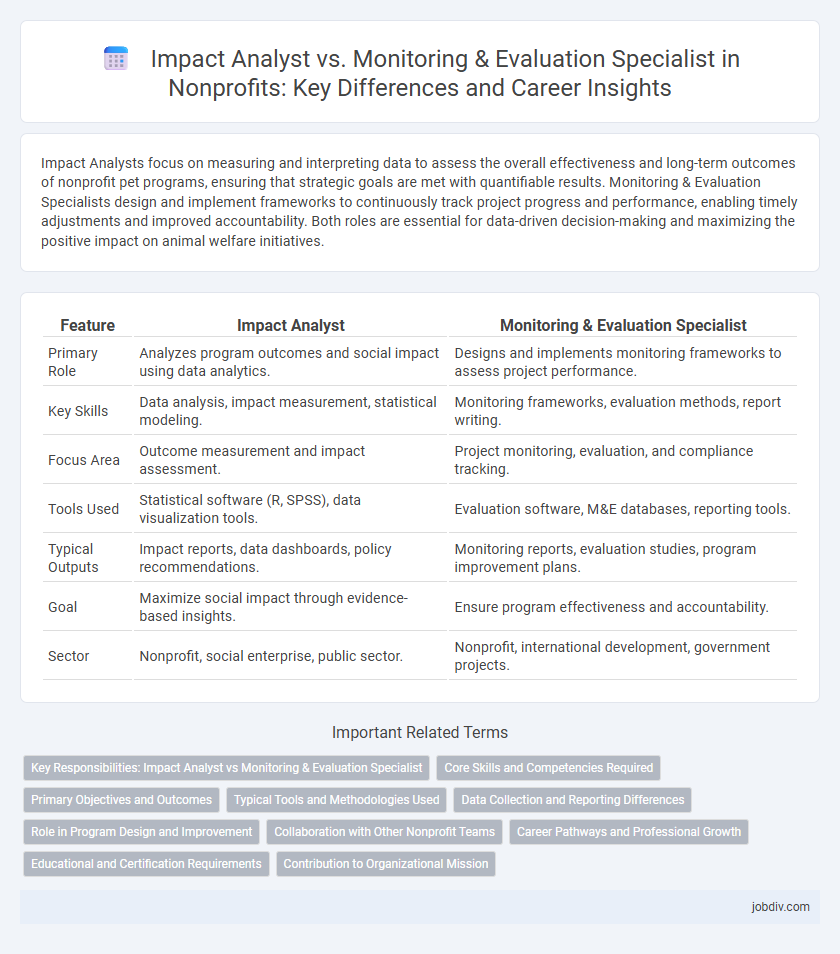Impact Analysts focus on measuring and interpreting data to assess the overall effectiveness and long-term outcomes of nonprofit pet programs, ensuring that strategic goals are met with quantifiable results. Monitoring & Evaluation Specialists design and implement frameworks to continuously track project progress and performance, enabling timely adjustments and improved accountability. Both roles are essential for data-driven decision-making and maximizing the positive impact on animal welfare initiatives.
Table of Comparison
| Feature | Impact Analyst | Monitoring & Evaluation Specialist |
|---|---|---|
| Primary Role | Analyzes program outcomes and social impact using data analytics. | Designs and implements monitoring frameworks to assess project performance. |
| Key Skills | Data analysis, impact measurement, statistical modeling. | Monitoring frameworks, evaluation methods, report writing. |
| Focus Area | Outcome measurement and impact assessment. | Project monitoring, evaluation, and compliance tracking. |
| Tools Used | Statistical software (R, SPSS), data visualization tools. | Evaluation software, M&E databases, reporting tools. |
| Typical Outputs | Impact reports, data dashboards, policy recommendations. | Monitoring reports, evaluation studies, program improvement plans. |
| Goal | Maximize social impact through evidence-based insights. | Ensure program effectiveness and accountability. |
| Sector | Nonprofit, social enterprise, public sector. | Nonprofit, international development, government projects. |
Key Responsibilities: Impact Analyst vs Monitoring & Evaluation Specialist
Impact Analysts specialize in interpreting data to assess program effectiveness and inform strategic decisions, focusing on measuring long-term social change and stakeholder impact. Monitoring & Evaluation Specialists design and implement frameworks to track project progress, conduct baseline and endline evaluations, and ensure compliance with donor requirements. Both roles collaborate to optimize nonprofit outcomes by combining rigorous data analysis with systematic program assessment.
Core Skills and Competencies Required
Impact Analysts require strong data analysis, statistical proficiency, and expertise in evaluative research methods to measure program outcomes effectively. Monitoring & Evaluation Specialists excel in project management, indicator development, and qualitative and quantitative assessment techniques to track progress and ensure accountability. Both roles demand critical thinking, communication skills, and a deep understanding of nonprofit sector goals and impact frameworks.
Primary Objectives and Outcomes
Impact Analysts primarily focus on measuring and interpreting the overall effects of nonprofit programs through data analysis and reporting to inform strategic decisions. Monitoring & Evaluation Specialists concentrate on systematically tracking project activities and assessing their effectiveness to ensure goals are met and improve program implementation. Both roles collaborate to enhance accountability and optimize the social impact of nonprofit initiatives.
Typical Tools and Methodologies Used
Impact Analysts commonly utilize data analytics software like SPSS, R, and Tableau to interpret quantitative impact metrics, while applying frameworks such as Theory of Change and Logic Models for causal analysis. Monitoring & Evaluation Specialists often employ mixed-method approaches including qualitative tools like focus groups and key informant interviews alongside quantitative surveys, supported by platforms such as DevResults and DHIS2 for real-time project tracking. Both roles leverage Statistical Analysis System (SAS) and Geographic Information Systems (GIS) to enhance data precision and contextual understanding in nonprofit program assessments.
Data Collection and Reporting Differences
Impact Analysts primarily focus on quantitative data collection methods using advanced statistical tools and software to measure program effectiveness, emphasizing real-time data analysis for informed decision-making. Monitoring & Evaluation Specialists employ both qualitative and quantitative approaches, integrating field data collection, stakeholder feedback, and periodic reporting to assess overall program performance and compliance with donor requirements. The key distinction lies in the Impact Analyst's emphasis on data-driven impact measurement, while M&E Specialists prioritize comprehensive monitoring frameworks and systematic evaluation processes.
Role in Program Design and Improvement
Impact Analysts utilize data analytics and quantitative methods to assess program outcomes, providing actionable insights for refining nonprofit strategies. Monitoring & Evaluation Specialists emphasize qualitative and quantitative assessments throughout project cycles to measure effectiveness and inform ongoing adjustments. Both roles contribute critical feedback loops that enhance program design and drive continuous improvement in nonprofit initiatives.
Collaboration with Other Nonprofit Teams
Impact Analysts collaborate closely with fundraising and program teams to analyze data that drives strategic decisions and optimizes resource allocation. Monitoring & Evaluation Specialists work alongside field staff and community engagement teams to ensure data collection processes align with project goals and stakeholder needs. Both roles prioritize cross-departmental communication to enhance program effectiveness and demonstrate measurable outcomes to donors.
Career Pathways and Professional Growth
Impact Analysts typically focus on data-driven assessments to measure program outcomes and inform strategic decisions, while Monitoring & Evaluation Specialists design and implement frameworks to systematically track project progress and effectiveness. Both roles offer career pathways in data analytics, research, and program management within the nonprofit sector, with opportunities to advance into senior analytical or managerial positions. Professional growth involves developing expertise in statistical tools, qualitative and quantitative methods, and gaining experience in stakeholder communication and reporting.
Educational and Certification Requirements
Impact Analysts typically hold a bachelor's degree in social sciences, statistics, or data analytics, with certifications such as Certified Analytics Professional (CAP) enhancing their qualifications. Monitoring & Evaluation Specialists often require a master's degree in international development, public policy, or related fields, complemented by certifications like the Project Management Professional (PMP) or specialized M&E certifications from organizations such as the International Program for Development Evaluation Training (IPDET). Both roles emphasize strong analytical skills, but the M&E Specialist's education and certification focus more on program design and evaluation methodologies to optimize nonprofit interventions.
Contribution to Organizational Mission
Impact Analysts provide data-driven insights by measuring program effectiveness and identifying trends that inform strategic decisions, directly supporting the nonprofit's mission advancement. Monitoring & Evaluation Specialists systematically design and implement evaluation frameworks to assess project outcomes and ensure accountability, fostering continuous improvement aligned with organizational goals. Both roles are essential for evidence-based management, enhancing transparency and demonstrating the nonprofit's contribution to social impact.
Impact Analyst vs Monitoring & Evaluation Specialist Infographic

 jobdiv.com
jobdiv.com